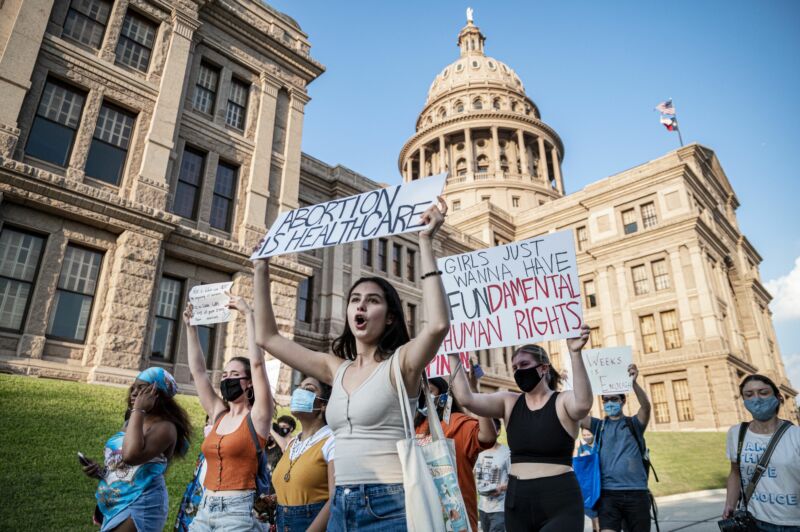Tens of thousands of pregnancies from rape occurring in abortion-ban states

Fourteen states have banned abortions at any gestational age since the Supreme Court overruled Roe v. Wade in 2022. Since the enactment of those abortion bans, an estimated 64,565 people became pregnant as a result of rape in those states. But, while five of the 14 states have exceptions for rape, all of the states logged only 10 or fewer legal abortions per month since their respective bans were enacted.
The finding, published this week in JAMA Internal Medicine, is a stark look at the effects of such bans on reproductive health care. The study did not assess how many of the estimated 64,565 pregnancies resulted in births, but it makes clear that tens of thousands of pregnant rape survivors, including children, were forced to turn to illegal procedures, self-managed abortions, or burdensome travel to states where abortion is legal—cost-prohibitive to many—as an alternative to carrying a rape-related pregnancy to term.
It also showed that legal exceptions for rape don’t work. The states with those exceptions apply stringent time limits on the pregnancy and require victims to report their rapes to law enforcement, which likely disqualifies most. The US Department of Justice estimates that only 21 percent of victims report their rape to police, for myriad reasons.
In an editor’s note accompanying the study, a trio of JAMA Internal Medicine editors—who are also medical researchers at the University of California, San Francisco, Harvard, and NYC Health and Hospitals—note the findings “demonstrate the scope of the problem,” as the number of rape-related pregnancies is “exponentially larger” than the number of legal abortions in those states.
“As physicians, we do not see abortion as a political, religious, or legal issue. Rather we see access to safe abortions as a necessary part of reproductive health services to protect the physical and mental well-being of patients. The best solution to this problem is a national law protecting the right of all people to choose to terminate pregnancy,” they write.
Study design
The study, led by a researcher at Planned Parenthood of Montana, is only an estimate because hard, state-level numbers are impossible to come by. The researchers pulled rape data from the DOJ’s Bureau of Justice Statistics, the FBI, and the Centers for Disease Control and Prevention’s National Intimate Partner and Sexual Violence survey, a specially designed survey to ascertain reported and unreported rapes.
With national data from various sources, the researchers estimated the proportion of rape survivors that are female individuals ages 15 to 45, and they further adjusted for the number of rapes that are vaginal. To estimate state-level rapes, they proportioned the rapes by states based on the FBI’s 2022 crime data, which includes rapes. They then multiplied each state’s rapes by the fraction of rapes likely to result in pregnancy. And finally, adjusted for the months between July 1, 2022 and January 1, 2024 that an abortion ban was in effect in each of the 14 states. Among the 14 states, the number of months in which a ban was in effect ranged from four to 18 months.
In all, the researchers estimated 519,981 completed vaginal rapes in the 14 abortion ban states which resulted in a collective total of 64,565 pregnancies during the four to 18 months that bans were in effect. Of the rape-related pregnancies, an estimated 5,586 (9 percent) were in states with rape exceptions, and 58,979 (91 percent) were in states with no exception.
Texas, the abortion-ban state with the largest population, had an estimated 26,313 (41 percent) of all rape-related pregnancies under its ban, which was enacted for 16 months during the study time frame. The state’s large number drew outrage from Democratic state lawmakers, particularly in light Gov. Greg Abbott’s vow to “eliminate rape” in Texas after a 2021 six-week abortion ban took effect (the state enacted a total ban in August 2022).
“Women and girls across our state are enduring unwanted pregnancies, suffering from life-endangering complications in desired pregnancies and fleeing the state for medical care,” the 13 Democratic state senators said in a Thursday news release, as reported by the Houston Chronicle. “We cannot allow this to be the new norm.”
https://arstechnica.com/?p=1999327